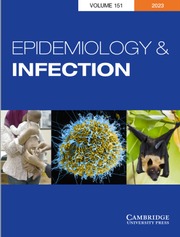Article contents
A Study of the Mechanism of the Agglutination and Absorption of Agglutinin Reaction, together with an examination of the efficacy of these tests for identifying specimens of the Meningococcus isolated from 354 cases of Cerebro-Spinal Fever
Published online by Cambridge University Press: 15 May 2009
Extract
At the present time owing to the difficulties arising from was conditions, and the stress of work due to the special circumstances in which the study of bacteriology is being prosecuted, we have had in some cases to modify established methods of bacteriological procedure and introduce new technique.
- Type
- Research Article
- Information
- Copyright
- Copyright © Cambridge University Press 1918
References
page 319 note 1 Zeitschr. Chem. Ind. Koll. 1908, iii. 2.Google Scholar
page 321 note 1 Zeitschr. f. Hyg. 1902, XL. 155.Google Scholar
page 323 note 1 Arch. Intern. Phys. 1908, vii. fasc. 1 and 2.Google Scholar
page 324 note 1 Journ. Hyg. 1917, xv. 500.Google Scholar
page 324 note 2 Zeitsehr. f. Hyg. 1902, XL.Google Scholar
page 326 note 1 Centralbl. f. Bakteriol. 1903, xxxiii.Google Scholar
page 326 note 2 Centralbl. f. Bakteriol, Orig., 1904, xxxvi. pp. 427, 694; 1905, xxxviii. p. 100.Google Scholar
page 327 note 1 Journ. Physiol. 1912–1913, XLV. 261 and 295.Google Scholar
page 328 note 1 Centralbl. f. Bakteriol, Referate, 1913, LXXV. 14.Google Scholar
page 330 note 1 Univ. Toronto Stud. Phys. Lab. 36.
page 331 note 1 Journ. Ghent. Soe. 1895, LXVI. and LXVII.Google Scholar
page 331 note 2 Journ. Physiol. xxiv. 170Google Scholar and Proc. Boy. Soc. 1900, LXVI. 101.Google Scholar
page 331 note 3 Journ. Physiol. XLV. 261.Google Scholar
page 337 note 1 Cenlratbl.f. Bakteriol. Orig., 1904, xxxvi. pp. 427, 694 and 1905, xxxviii. p. 100.Google Scholar
page 347 note 1 The differentiation by means of the absorption of agglutinins test of the types of meningococci obtained from the cerebro-spinal fluid of cases during the current outbreak of cerebro-spinal fever. Journ. Boy. Army Mat. Corps, 07 1917.Google Scholar
- 1
- Cited by


